OBSSR 20th Anniversary Video Competition – “I AM A BEHAVIORAL AND SOCIAL SCIENTIST”

Joe De Sena '90, Human Ecology and co-founder of Spartan Race, extreme athletic competitions held worldwide, interviewed Professor Robert Sternberg as part of a podcast series called, "Spartan Up!" In this episode, Dr. Sternberg discusses why creativity, practical thinking, wisdom and ethics are better indicators of intelligence than IQ scores.
By Jann Ingmire Reprinted from Futurity.org
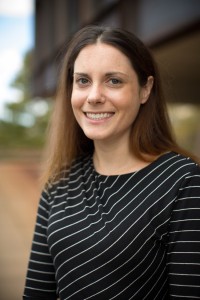
Young children who hear more than one language spoken at home become better communicators, a new study finds. Effective communication requires the ability to take others’ perspectives.
Researchers discovered that children from multilingual environments are better at interpreting a speaker’s meaning than children who are exposed only to their native tongue.
The most novel finding is that the children don’t even have to be bilingual themselves—it’s the exposure to more than one language that is the key for building effective social communication skills.
Previous studies have examined the effects of being bilingual on cognitive development. This study, published online in Psychological Science, is the first to demonstrate the social benefits of just being exposed to multiple languages.
“Children in multilingual environments have extensive social practice in monitoring who speaks what to whom, and observing the social patterns and allegiances that are formed based on language usage,” explains Katherine Kinzler, associate professor of psychology at the University of Chicago. [Over the summer, Kinzler joined the faculty of the Department of Human Development.]
“These early socio-linguistic experiences could hone children’s skills at taking other people’s perspectives and provide them tools for effective communication.”
Study coauthor Boaz Keysar, professor of psychology, says the study is part of a bigger research program that attempts to explain how humans learn to communicate. “Children are really good at acquiring language. They master the vocabulary and the syntax of the language, but they need more tools to be effective communicators,” says Keysar. “A lot of communication is about perspective-taking, which is what our study measures.”
Keysar, Kinzler, and their coauthors, doctoral students in psychology Samantha Fan and Zoe Liberman, had 72 4- to 6- year- old children participate in a social communication task. The children were from one of three language backgrounds: monolinguals (children who heard and spoke only English and had little experience with other languages); exposures (children who primarily heard and spoke English, but they had some regular exposure to speakers of another language); and bilinguals (children who were exposed to two languages on a regular basis and were able to speak and understand both languages). There were 24 children in each group.
Each child who participated sat on one side of a table across from an adult and played a communication game that required moving objects in a grid. The child was able to see all of the objects, but the adult on the other side of the grid had some squares blocked and could not see all the objects. To make sure that children understood that the adult could not see everything, the child first played the game from the adult’s side.
For the critical test, the adult would ask the child to move an object in the grid. For example, she would say, “I see a small car, could you move the small car?” The child could see three cars: small, medium, and large. The adult, however, could only see two cars: the medium and the large ones. To correctly interpret the adult’s intended meaning, the child would have to take into account that the adult could not see the smallest car, and move the one that the adult actually intended—the medium car.
The monolingual children were not as good at understanding the adult’s intended meaning in this game, as they moved the correct object only about 50 percent of the time. But mere exposure to another language improved children’s ability to understand the adult’s perspective and select the correct objects.
The children in the exposure group selected correctly 76 percent of the time, and the bilingual group took the adult’s perspective in the game correctly 77 percent of the time.
“Language is social,” notes Fan. “Being exposed to multiple languages gives you a very different social experience, which could help children develop more effective communication skills.”
Liberman adds, “Our discovery has important policy implications, for instance it suggests previously unrealized advantages for bilingual education.”
Some parents seem wary of second-language exposure for their young children, Kinzler comments. Yet, in addition to learning another language, their children might unintentionally be getting intensive training in perspective taking, which could make them better communicators in any language.
 Scholars funded through the Institute for the Social Sciences’ small grant program this spring seek to answer such questions as, how do economic crises affect voters’ behavior, and how do public perceptions of social inequality influence efforts to mobilize cooperative solutions to climate change?
Scholars funded through the Institute for the Social Sciences’ small grant program this spring seek to answer such questions as, how do economic crises affect voters’ behavior, and how do public perceptions of social inequality influence efforts to mobilize cooperative solutions to climate change?
Twice yearly, the Institute for the Social Sciences (ISS) provides up to $12,000 to tenured and tenure-track faculty through its peer-reviewed small grant program. This spring, faculty from six different colleges won awards.
“One of the strengths of the program is that it forges interdisciplinary connections across campus, both in the traditional strongholds of the social sciences and units where scholars are working at the boundaries of social sciences, humanities and life sciences,” said Kim Weeden, professor of sociology and the Robert S. Harrison Director of ISS.
One of these boundary-spanning projects is a collaborative effort between Malte Jung and Steven Jackson, both in Computing and Information Sciences, and a surgical team at Weill Medical College in New York City. They will compare robotic and laparoscopic surgical teams.
Christopher Huckfeldt, assistant professor in economics, is calibrating a macroeconomic model of unemployment with data from the Panel Study of Income Dynamics. He is applying quantitative macroeconomic theory to assess the importance of occupational downgrading in generating permanent income losses for workers who lose their job during a recession.
“The ISS grant has put me on a faster track to accomplish the research goals associated with my project. As a junior faculty member, this type of grant is invaluable for establishing a long-term research agenda,” Huckfeldt said.
Claire Lim, assistant professor in economics, is looking at how deregulation, mergers and acquisitions, and changes in regulators’ ideology, have affected executive compensation in the domestic energy industry. She’s also examining how political environments in the U.S. influence the regulation and conduct of energy firms.
Using the Charles Manson murders and subsequent trials in the early 1970s as a stage, Claudia Verhoeven, associate professor in history, hopes to invigorate the historiography through analysis of gender, class, race, geo-politics, pop and mass culture, social movements, religion, the justice system, mass media and militant environmentalism. She intends to properly situate the case in the context of the late 1960s, and provide it with a reception history – a history of the way events were portrayed and perceived at the time.
Jonathon Schuldt, assistant professor of communication, will use his ISS grant to study how socioeconomic status influences beliefs and intentions to address and mitigate climate change.
Alexander Kuo, assistant professor of government, will use the grant to conduct surveys before and after the 2015 national elections in Spain to analyze how an economic crisis affects voter behavior and supports new political movements.
The ISS’ small grants program also is supporting two upcoming conferences.
Trevor Pinch and collaborators Michael Lynch and Bruce Lewenstein, all from science and technology studies, are using ISS funds to support a 2016 conference to take stock of the field of science and technology studies, what it has accomplished and where it is headed.
Another conference, led by Gustavo Flores-Macias, assistant professor in government, is bringing together leading scholars on the political economy of Latin America in a conference to address taxation and its importance to inequality and economic development.
Other recipients of spring 2015 small grants include Adam Anderson, associate professor in human development; Garrick Blalock, associate professor in the Dyson School of Applied Economics and Management; John Forester, professor in city and regional planning; Karel Mertens, associate professor of economics; David Mimno, assistant professor in information science; and Luo Zuo, assistant professor of accounting.
The deadline for the fall 2015 small grants competition is Sept. 8, and applications will be requested shortly after the fall semester begins.
Lori Sonken is the staff writer for the Institute for the Social Sciences.
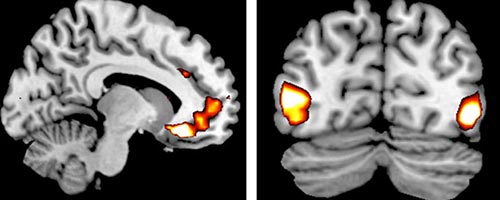
As research subjects viewed emotion-laden pictures while an fMRI (functional magnetic resonance imagining) machine scanned their brains for activity, researchers in a Cornell-University of British Columbia-University of Toronto study began to think: Perhaps our genes really can regulate response to emotional information.
Carriers of a genetic variation (the ADRA2b deletion variant) showed more vivid perceptions of emotional events (called emotionally enhanced vividness or EEV), which was associated with more activity in a region of the brain responsible for regulating emotions and evaluating pleasure and threat (the ventromedial prefrontal cortex), researchers reported in the April 22 Journal of Neuroscience.
The 2014 study was a relatively small one, with 39 subjects undergoing fMRI scans at the University of Toronto. Slightly more than half (21) carried the ADRA2b deletion variant, and the rest did not. But the result was clear. Some people are genetically wired, as the researchers report, to “enhance the subjective vividness of perceptual experience and its emotional enhancement.”
“Emotions are not only about how we feel about the world, but how our brains construct our perception of it,” says Adam K. Anderson, Cornell associate professor of human development and the study’s senior author.
“Our genes influence how our brains see the positive and negative aspects of our world more vividly. As a result, we may come to mistakenly believe the world has more rewards or threats.” “People really do see the world differently,” said Rebecca Todd, first author and assistant professor of psychology at the University of British Columbia. “For people with this gene variation, the emotionally relevant things in the world stand out much more.”
Todd said she believes emotionally enhanced vividness may help explain why some people are more susceptible to PTSD (post-traumatic stress disorder) and intrusive memories following trauma.
The report is titled “Neurogenic Variations in Norepinephrine Availability Enhance Perceptual Vividness.” The study was supported, in part, by the Canadian Institutes of Health Research.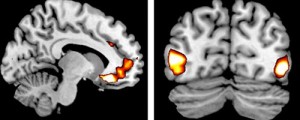
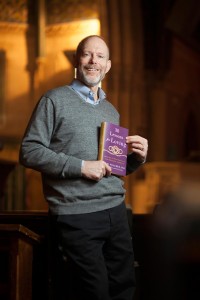
With wedding season in full swing, America’s newlyweds stand to learn from the experts: older adults whose love has endured job changes, child-rearing, economic certainty, health concerns and other life challenges.
Filling our knowledge gap on finding a mate and remaining married, Cornell gerontologist Karl Pillemer completed the Cornell Marriage Advice Project, the largest in-depth interview study ever done of people in very long unions, surveying more than 700 individuals wedded for a total of 40,000 years. The findings are detailed in Pillemer’s book, “30 Lessons for Loving: Advice from the Wisest Americans on Love, Relationships, and Marriage.”
To capture the voice of lived experience, Pillemer conducted a random national survey of nearly 400 Americans age 65 and older, asking how to find a compatible partner and other advice on love and relationships. In subsequent in-person interviews with more than 300 long-wedded individuals – those in unions of 30, 40, 50, or more years – Pillemer captured more insights for overcoming common marriage troubles. His team interviewed divorced individuals, too, asking how others might avoid marital breakups.
The average age of interviewees was 77 and included 58 percent women and 42 percent men. The average length of marriage in the sample was 44 years; the couple with the longest marriage were ages 98 and 101 and had been married 76 years. Responses were coded into the most commonly occurring recommendations, resulting in a list of the most frequently selected lessons for a successful, long-term relationship.
“Rather than focus on a small number of stories, my goal was to take advantage of the ‘wisdom of crowds,’ collecting the love and relationship advice of a large and varied cross-section of long-married elders in a scientifically reliable and valid way,” said Pillemer.
Pillemer uncovered common advice for couples walking down the aisle or decades into marriage. The top five lessons from the elders, along with Pillemer’s analysis:
Learn to communicate: “For a good marriage, the elders overwhelmingly tell us to ‘talk, talk, talk.’ They believe most marital problems can be solved through open communication, and conversely many whose marriages dissolved blamed lack of communication.”
Get to know your partner very well before marrying: “Many of the elders I surveyed married very young; despite that fact, they recommend the opposite. They strongly advise younger people to wait to marry until they have gotten to know their partner well and have a number of shared experiences. An important part of this advice is a lesson that was endorsed in very strong terms: Never get married expecting to be able to change your partner.”
Treat marriage as an unbreakable, lifelong commitment: “Rather than seeing marriage as a voluntary partnership that lasts only as long as the passion does, the elders propose a mindset in which it is a profound commitment to be respected, even if things go sour over the short term. Many struggled through dry and unhappy periods and found ways to resolve them – giving them the reward of a fulfilling, intact marriage in later life.”
Learn to work as a team: “The elders urge us to apply what we have learned from our lifelong experiences in teams – in sports, in work, in the military – to marriage. Concretely, this viewpoint involves seeing problems as collective to the couple, rather than the domain of one partner. Any difficulty, illness, or setback experienced by one member of the couple is the other partner’s responsibility.”
Chose a partner who is very similar to you: “Marriage is difficult at times for everyone, the elders assert, but it’s much easier with someone who shares your interests, background and orientation. The most critical need for similarity is in core values regarding potentially contentious issues like child-rearing, how money should be spent and religion.”
According to Pillemer, “These unique insights show the value of using rigorous survey methods to uncover the practical wisdom of older people. Although a number of general studies of elder wisdom have been conducted, no one had researched the specific advice elders have for a critical life domain like marriage. Therefore, the study points the way toward the need for future research on concrete lessons we learn over the course of our lives.”
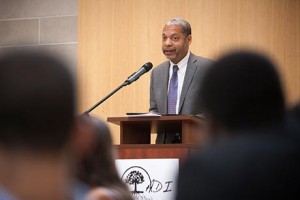
In 1890, ex-slave George Washington Fields became the first African- American to graduate from Cornell Law School. Nearly 125 years later, the Office of Academic Diversity Initiatives (OADI) continues to celebrate diversity at Cornell with a series of awards named after Fields and nine other Cornellian trailblazers.
More than 70 people gathered May 1 for the second annual OADI Honors Awards Ceremony. Student presentations, a dinner reception and musical performances kicked off the event, which highlighted accomplishments and contributions of some of Cornell’s most talented scholars and leaders.
OADI is pronounced “wadi,” which is an Arabic and Swahili word for a cool, protected passage through a desert, often formed by a seasonal river. OADI was formed in 2011 as part of an initiative to provide support and mentorship to Cornell students who come from historically underrepresented backgrounds.
“These services play a crucial role in fulfilling Cornell University’s ‘any person, any study’ motto,” said Carlos Gonzalez, executive director of OADI.
Engineering Dean Lance Collins gave the keynote address for the awards ceremony. The first African-American dean at Cornell, Collins shared his insights on the role of diversity in the three core pillars of academic excellence: scholarship, leadership and community engagement.
Collins encouraged the audience to seek mentors and to mentor others, to lead by inspiring others to take action, and to work for results rather than recognition.
Collins also emphasized the importance of thinking about diversity not only as a social justice issue, but also in terms of the inherent value that it brings to society. “We are a pluralistic society, and there is great power and strength in that,” he said. “Each of you in the audience brings something special and unique and positive, adding to the excellence of this institution.”
OADI presented 10 awards named after some of Cornell’s most inspiring trailblazers that recognized achievement and excellence of scholar-leaders and campus partners. This year’s recipients were:
Thaddeus Talbot '15 was selected as the student speaker for the awards ceremony. Earlier this year, Talbot marched in Selma, Alabama, to commemorate the 50th anniversary of the 1965 voting rights marches from Selma to Montgomery.
“Tonight is all about taking risks and the rewards that follow,” said Talbot.
Josephine Engreitz ’15 is a writer intern for the Cornell Chronicle.
Fourteen Cornell scholars (11 faculty members and one faculty member-graduate student team) received 2015 awards from the Jeffrey S. Lehman Fund for Scholarly Exchange with China. The fund provides grants to initiate research projects, sponsor research-related conferences or workshops, host visitors from China or support faculty travel to China to work on collaborative research projects.
Projects and winners are:
For more information, contact the East Asia Program in the Mario Einaudi Center for International Studies at cueap@cornell.edu.
Students, faculty and staff in Cornell's contract colleges have won State University of New York (SUNY) Chancellor's Awards for Excellence for 2015.
Faculty and staff recipients of the award have served their campuses and communities with distinction. Students were honored as leaders, role models and volunteers, and for their academic achievements.
Those honored this year are:
Stephen Ceci, Cornell’s Helen L. Carr Professor of Developmental Psychology, and 15 other scholars nationwide have been elected the newest members of the National Academy of Education (NAEd) for their outstanding scholarship on education. The NAEd advances high-quality education research and its application to policy formation and practice.
Ceci, a professor in the Department of Human Development in the College of Human Ecology, has authored or co-authored more than 400 academic publications and won numerous awards, such as the E.L. Thorndike Award for Lifetime Contribution in Research from the American Psychological Association, the Distinguished Scientific Contributions to Child Development Award from the Society for Research in Child Development and the James McKeen Cattell Fellow Award from the Association for Psychological Science.
His education-related research has focused on women and science, including numerous inquiries into the reasons for female academics’ underrepresentation in math-intensive fields, as well as his bio-ecological theory of intelligence.
Ceci joins current Cornell scholars Robert Sternberg, professor of human development, and Ronald Ehrenberg, the Irving M. Ives Professor of Industrial and Labor Relations and Economics, as NAEd members.
In another honor, Ceci was recently inducted in the Federation of Associations in Behavioral & Brain Sciences Gallery of Scientists.